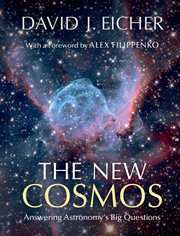Book contents
- Frontmatter
- Dedication
- Contents
- Foreword
- Preface
- Acknowledgments
- 1 The awakening of astronomy
- 2 How the Sun will die
- 3 The end of life on Earth
- 4 How the Moon formed
- 5 Where has all the water gone?
- 6 Why did Venus turn inside-out?
- 7 Is Pluto a planet?
- 8 Planets everywhere…
- 9 The Milky Way as barred spiral
- 10 Here comes Milkomeda
- 11 The Big Bang's cosmic echo
- 12 How large is the universe?
- 13 The mystery of dark matter
- 14 The bigger mystery of dark energy
- 15 Black holes are ubiquitous
- 16 What is the universe's fate?
- 17 The meaning of life in the universe
- Glossary
- Bibliography
- Index
12 - How large is the universe?
Published online by Cambridge University Press: 05 December 2015
- Frontmatter
- Dedication
- Contents
- Foreword
- Preface
- Acknowledgments
- 1 The awakening of astronomy
- 2 How the Sun will die
- 3 The end of life on Earth
- 4 How the Moon formed
- 5 Where has all the water gone?
- 6 Why did Venus turn inside-out?
- 7 Is Pluto a planet?
- 8 Planets everywhere…
- 9 The Milky Way as barred spiral
- 10 Here comes Milkomeda
- 11 The Big Bang's cosmic echo
- 12 How large is the universe?
- 13 The mystery of dark matter
- 14 The bigger mystery of dark energy
- 15 Black holes are ubiquitous
- 16 What is the universe's fate?
- 17 The meaning of life in the universe
- Glossary
- Bibliography
- Index
Summary
It is absolutely amazing to know that shortly after the Big Bang, the universe was a relatively small, nearly infinitely dense place. It boggles the mind. But that was 13.8 billion years ago. The expanding universe means the entirety of what we know is now incredibly large, and is getting larger every day.
This is one area that two generations of science fiction movies have seriously distorted in the minds of the public at large. The general feeling that technology is pretty good and will know almost no bounds, and that we can almost certainly one day travel between star systems, are pretty much taken on faith. But what the sci-fi movies have failed to communicate, among other things, is that the universe is an INCREDIBLY LARGE place. Even distances between the very nearest objects are staggering, and the distances across the Milky Way Galaxy and certainly between galaxies in the universe are astonishingly huge to living beings stuck on a planet. A model of the Milky Way wherein the Sun is a grain of sand brings this home. On this scale, stars – sand grains – are 6 kilometers apart in the Milky Way's disk and the disk is about 60,000 kilometers across. Now who wants to go traveling from grain to grain?
The concept of the size of the universe has taken a huge stride forward in just the last few years. There was a time not too long ago when astronomers did not know even the approximate size of the cosmos with any degree of accuracy. We still don't know with high precision. The universe may be infinite.
The Big Bang Theory reminds us that once the universe was very small. We know the fastest radiation or any information can travel is the speed of light, 300 million m/s (186,000 miles per second). We also know the universe is 13.8 billion years old. We also know that a light-year is equal to approximately 9.4 trillion kilometers, or 6 trillion miles. In nearly 14 billion years, on first blush, we might expect radiation to expand radially outward to something like 30 billion light-years across.
- Type
- Chapter
- Information
- The New CosmosAnswering Astronomy's Big Questions, pp. 157 - 170Publisher: Cambridge University PressPrint publication year: 2015
- 1
- Cited by



